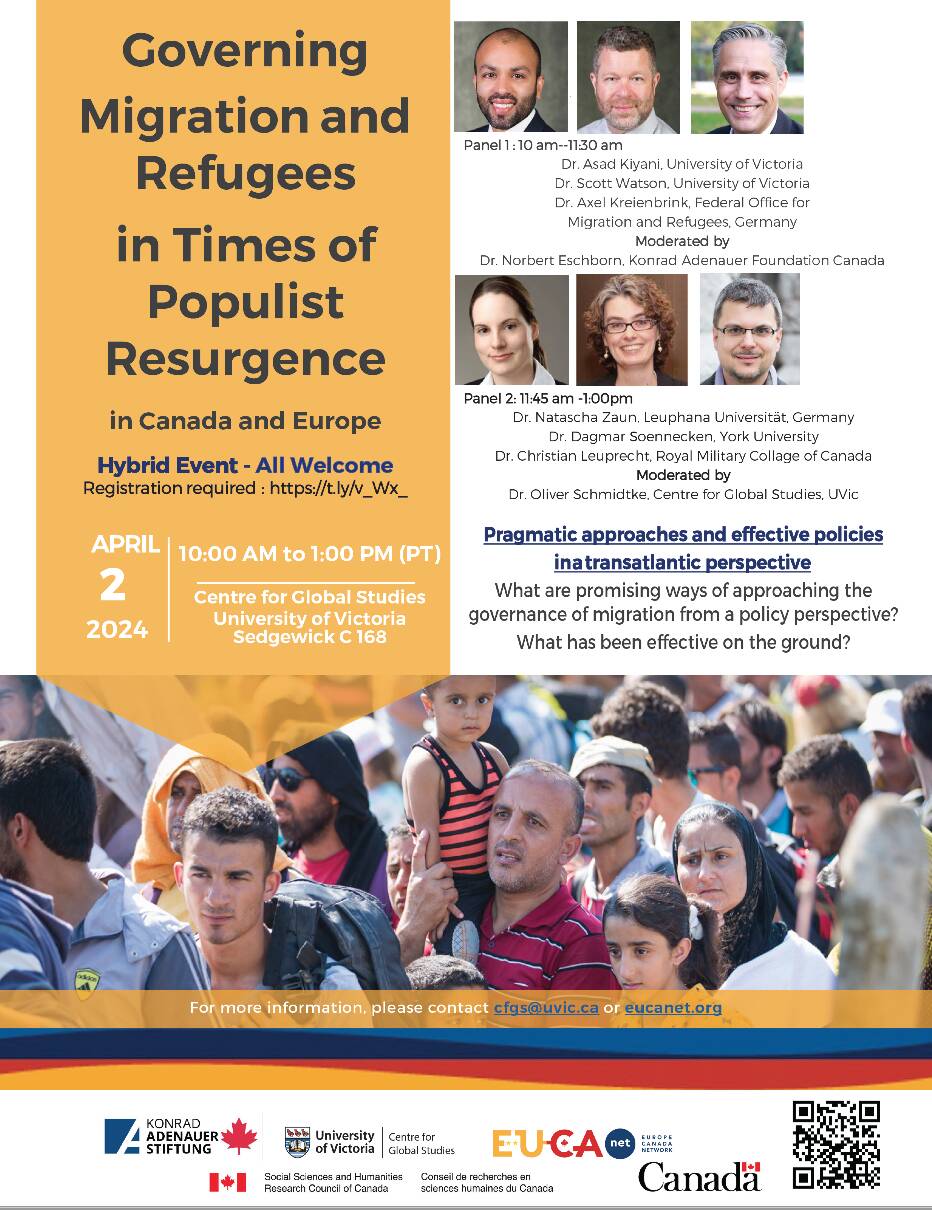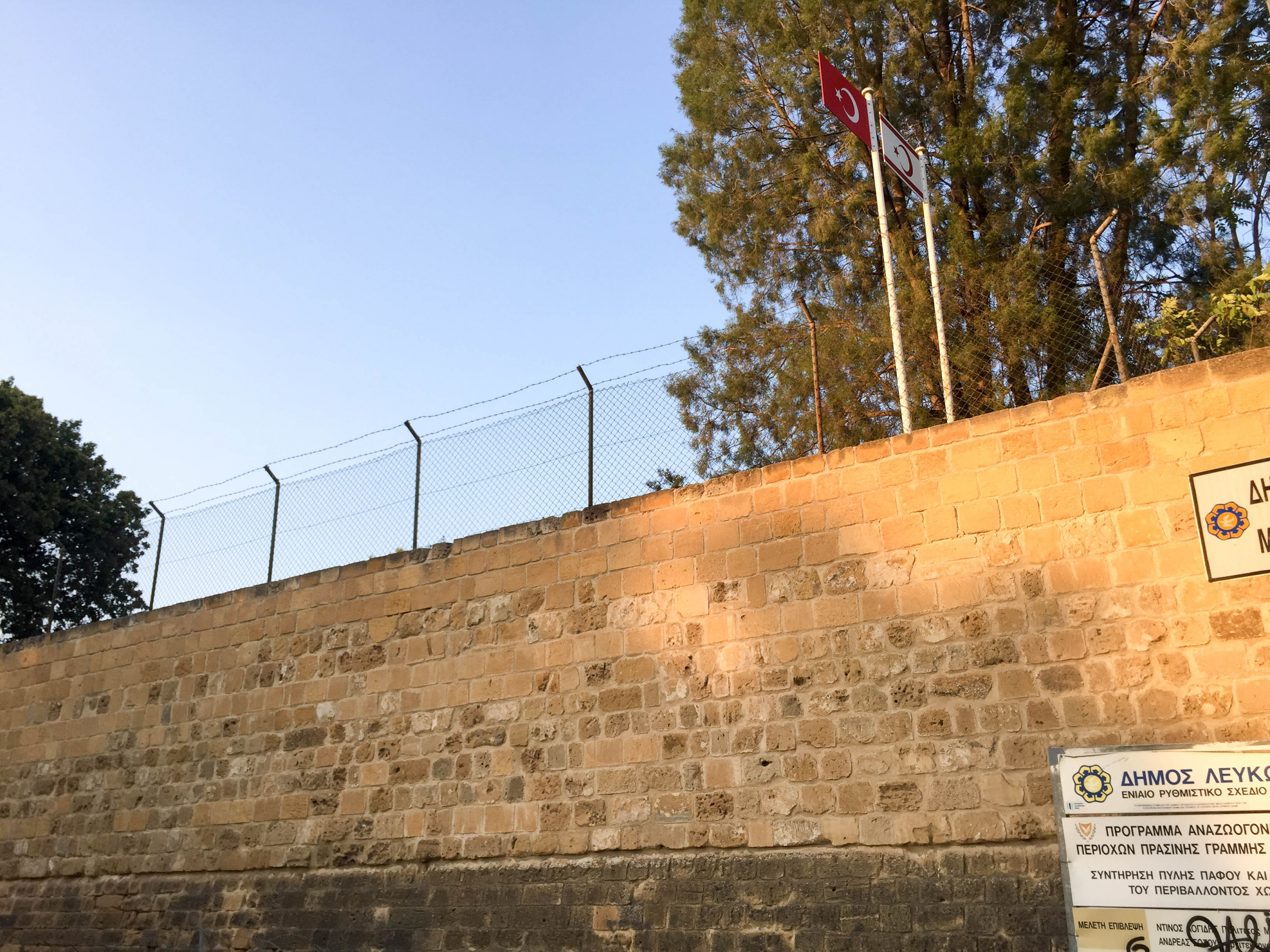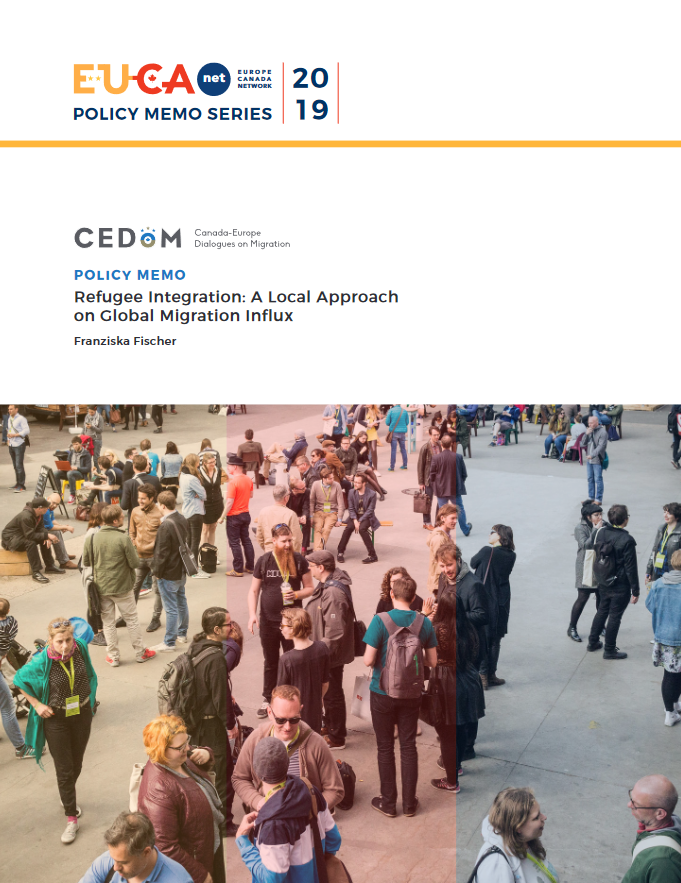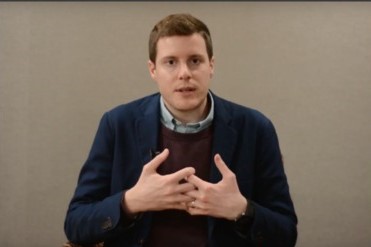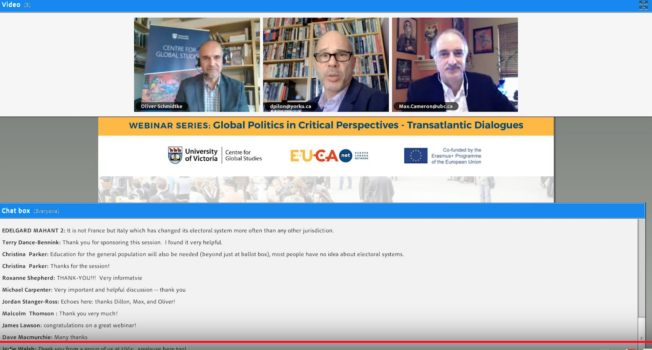Governing Migration and Refugees / Event Summary/ Video 1
Video Panel 1:
Governing Migration and Refugees in Times of Populist Resurgence
in Canada and Europe
On April 2, 2024 the Centre for Global Studies (University of Victoria) hosted a hybrid event co-sponsored by the Konrad Adenauer Foundation (KAS) Canada. The presenters of the two panels of the event addressed the following questions:
What are promising ways of approaching this politically thorny issue from a policy perspective?
What has worked, which approaches have proven to be effective and suitable/desirable in terms of their outcome on the ground?
Oliver Schmidtke (University of Victoria) introduced the themes of the event, namely the policy challenges that are posed with governing migration and refugees in Canada and Europe in the context of resurgent populism. He emphasized that while ‘migration’ is one of the dominant issues of our age, the implementation of the policies developed to regulate it are highly contested and they often generate a wide range of challenges. The issue has also become a tool of political mobilization for political parties and the extreme right in particular.
Schmidtke pointed at three paradoxes that shape the efforts to develop effective policies that are normatively desirable and that can be implemented. The liberal paradox relates to two phenomena that are visible in most liberal democracies. On the one hand, there are societies that are rapidly aging and are dependent on immigration to keep their economic prosperity viable. On the other hand, there is a political backlash and an identity-driven resistance to accepting more immigrants, which makes it very difficult to implement policies that would address these countries’ dependence on immigration. The second paradox relates to the challenges in implementing policies that regulate cross mobility in a world that, on the one side, is highly globalized and interconnected and, on the other side, has strongly tied border regimes. The third paradox highlighted by Schmidtke is the normative paradox faced by liberal democracies when it comes to deciding how to protect borders without violating fundamental humanitarian values and norms adhered and cherished by liberal democracies.
The panels’ presenters offered their insights to these paradoxes from different perspectives.
The first panel was moderated by Norbert Eschborn, who was KAS Canada’s founding director between 2019 and 2024.
Axel Kreienbrink began the conversation by outlining Germany’s rising number of asylum seekers and the hardship experienced by the municipalities that accommodate them. Dr. Kreienbrink noted the effects of this situation on the political discourse. The country’s right-wing populist parties as well as the other opposition parties blame the migrants for the existing problems and have put forward controversial proposals that created heated debates in Germany. According to Kreienbrink, these debates bear the risk of harming Germany’s attractiveness as a business hub and have prompted the counter-reaction of a group of German entrepreneurs against Germany’s right-wing populist Alternative for Germany (AfD) Party.
Kreienbrink continued by highlighting the efforts of Germany’s three-party coalition government to modernize some of the existing laws on immigration, easing the process of naturalisation, of skilled labor migration and asylum procedures while also promoting a return strategy. Further, evaluating the level of innovation and effectiveness produced by these new rules, Kreienbrink noted that the new citizenship rules are fairly innovative for Germany and that they have helped the country to align itself with other major immigration countries. However, he also added that it is too early to assess the effects of the law. With regards to the law on skilled labor migration, the expert noted that the new rules are intended to bring migrants faster into the work-force of the country and that Canada’s point system was a reference in the recent changes brought into the German law. Kreienbrink also stressed that this system might entail challenges in its implementation and overburden the authorities. With regard to the modernization of the asylum system, Kreienbrink explained that the government approved in 2022 a law to speed up the asylum court proceedings but that the topic is consistently framed by the opposition as ‘illegal migration’.
Beside these initiatives, the German government has also sought to conclude migration agreements with several countries, enabling both returns and legal migration. After long internal debates, the government has also started to implement border controls with Poland and the Czech Republic. According to Kreienbrink, the decrease in the number of asylum applications seems to show the success of this strategy, although its effects on the long-run remain to be seen. The expert concluded that migration is perceived by the population as a central problem in Germany and it will continue to shape the country’s politics.
Scott Watson’s presentation explored the implications of the anti-immigration narrative in Canada. He emphasized that within the broader movement of anti-globalism, the anti-immigration component comprises different approaches that range from outright conspiracy theories to more conventional economic and political concerns. He noted how, in the Canadian context, immigration has historically been a relatively depoliticized subject and that there has been an elite consensus that a certain level of immigration was positive to the country. According to Watson, this might be changing with the current Conservative party. However, Watson noted that while the securitization of migration and its framing as a threat are problematic, its depoliticization and the refusal to engage with migration in public debate may be just as problematic. In this sense, the scholar noted that the politicization of immigration in Canada may have a positive effect, in that it may force a public discussion over its role in Canada and the direction of Canadian immigration.
Watson also highlighted the shift that has taken place in the Canadian immigration policy over the last few decades, which indicates the reduction of avenues for permanent residency in favour of temporary ones and the increasing privatization of immigration, which allowed corporations to have a greater influence over Canada’s needs regarding immigration. For Watson, these trends indicate a larger concern with nation building or with democratic citizenship, and require an honest dialogue on immigration’s total numbers, its benefits and costs, as well as the vision for Canada. At the same time, issues like housing, crime and healthcare that have been connected to immigration need also to be openly addressed. These issues are not disconnected from the challenges posed to the international order’s focus on the rights of immigrants and asylum seekers and can be addressed by reinforcing Canada’s commitment to that order domestically.
Asad Kiyani’s presentation also focused on Canada’s approach to irregular migration, with a specific focus on the Canada-US Safe Third Country Agreement (STCA). Dr. Kiyani described Canada’s approach to irregular migration as an approach that attempts to eliminate ‘unsolicited irregular migration’ in an effective way. In this context, Canada, while still appearing to apply substantive international migration law and international humanitarian conventions has, in fact, increasingly shifted away from international regimes into legal regimes that are governed primarily by domestic law and regulation. The Safe Third Country Agreement, signed between Canada and the US in 2002 is one example of this trend. According to the STCA, which is similar to the Dublin regulation, refugee claimants are required to request asylum in the first safe country they arrive in, unless they qualify for an exception to the agreement. The US is the only country that is designated as a safe third country by Canada.
Kiyani noted that the STCA mainly benefits Canada, since the number of migrants crossing over from the US into Canada are much higher than the ones crossing from Canada into the US. However, the main challenge presented by the STCA is that the US is not a safe third country for asylum seekers. While this challenge has been brought to court, until recently it has been mostly treated as a procedural problem, rather than a substantial one. However, while this judicial avoidance seems to have started to change, the governmental and legislative levels are still characterized by indifference. Furthermore, the terms of this agreement have changed in 2023 in a process characterized by great secrecy and lack of public debate and it now applies to the entire US-Canada border. This, however, did not stop border crossings, rather pushing asylum claimants to seek more dangerous alternatives and tripling airport asylum claims. In this context Canada felt politically forced to accept around 15,000 asylum seekers from South America, but 4,000 of these people were accepted as temporary workers, thus reserving its right to return at least some of those people back.
Dr. Kiyani concluded his presentation noting that if we consider the hundreds of thousands visas recently issued to Ukrainian refugees, the justification for the change in the STCA offered by Canada – namely the shortcomings of the refugee determination system – is contradictory.
In the final part of the session the presenters responded to the questions of the public.
About the panelists:
Axel Kreienbrink is the Sub-Director of the Migration, Integration and Asylum Research Centre at the Federal Office for Migration and Refugees in Nuremberg (Germany). After graduating in History of political science he obtained his PhD in migration research at the University of Osnabrück. He is the head of Unit “International Migration and Migration Management” in the Research Centre of the Federal Office for Migration and Refugees in Nuremberg (Germany). He entered the Federal Office in 2005 and became Head of Unit in 2007. Dr Kreienbrink’s research topics cover international migration, irregular migration, return migration, migration and development, Muslims in Germany, demographic aspects of migration, and research for the European Migration Network EMN. He has several publications on migration history and migration policy in Germany, Spain and Europe.
Scott Watson (University of Victoria) is an associate professor in the Department of Political science. His research interests have centered on the construction of security threats and conditions of national insecurity, particularly in the realm of migration as well as the role various
actors play in these processes. He is the author of monographs such as the securitization of humanitarian migration (2009) and International order and the politics of disaster (2020). His research interests include the reconceptualization of human security and the emerging structures of a Global Order of governing migration with a particular focus on processes of securitization and the role that mass media and private actors play in this context.
Asad Kiyani (University of Victoria) is an associate professor in Law. He was called to the bar by the Law Society of Ontario in 2006 and he researches and teaches in a range of subjects broadly related to domestic and international criminal law. His research projects include a research on the factors affecting the decision-making of judges in racial profiling cases;
as well as on the limits and possibilities of using constitutional remedies to gather better information on the criminal justice system. Professor Kiyani is a recipient of the 2017 Antonio Cassese Prize for International Criminal Law Studies and the 2019 Hessel Yntema Prize for Comparative Law.
